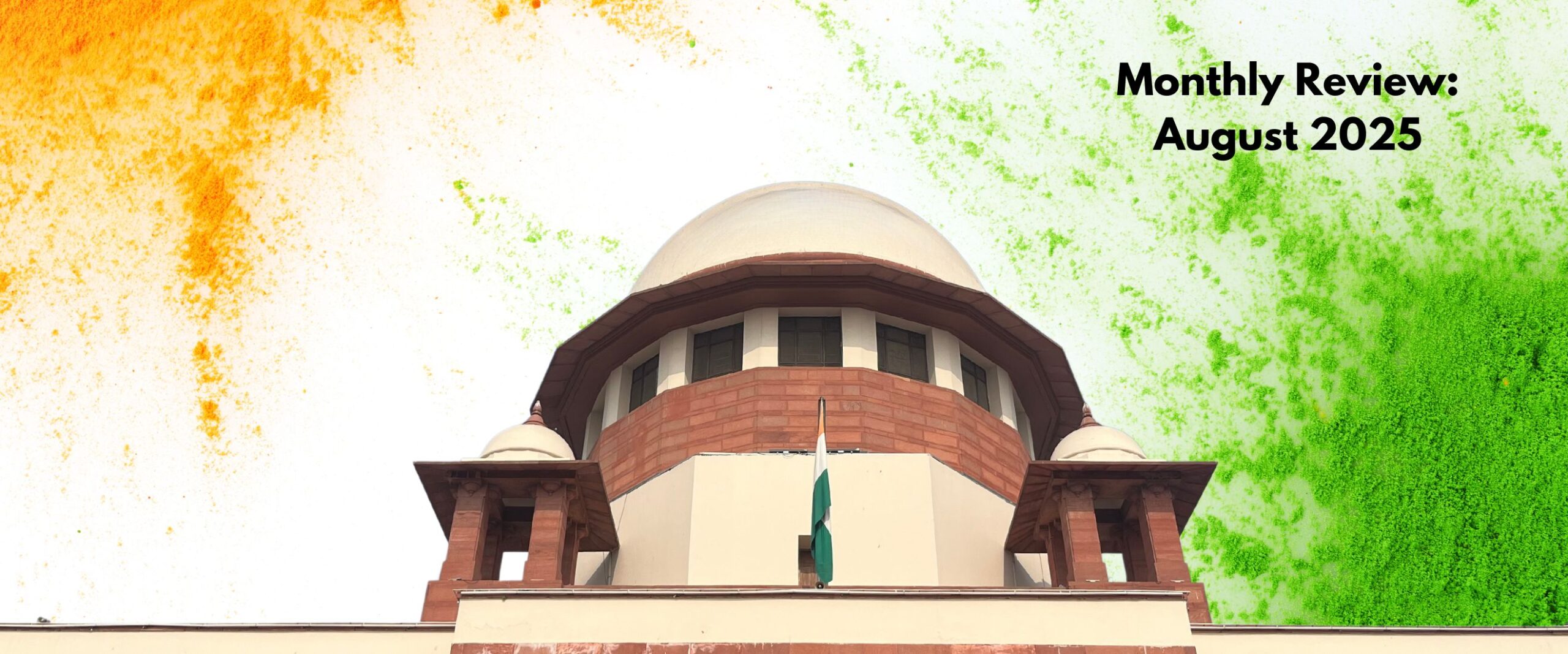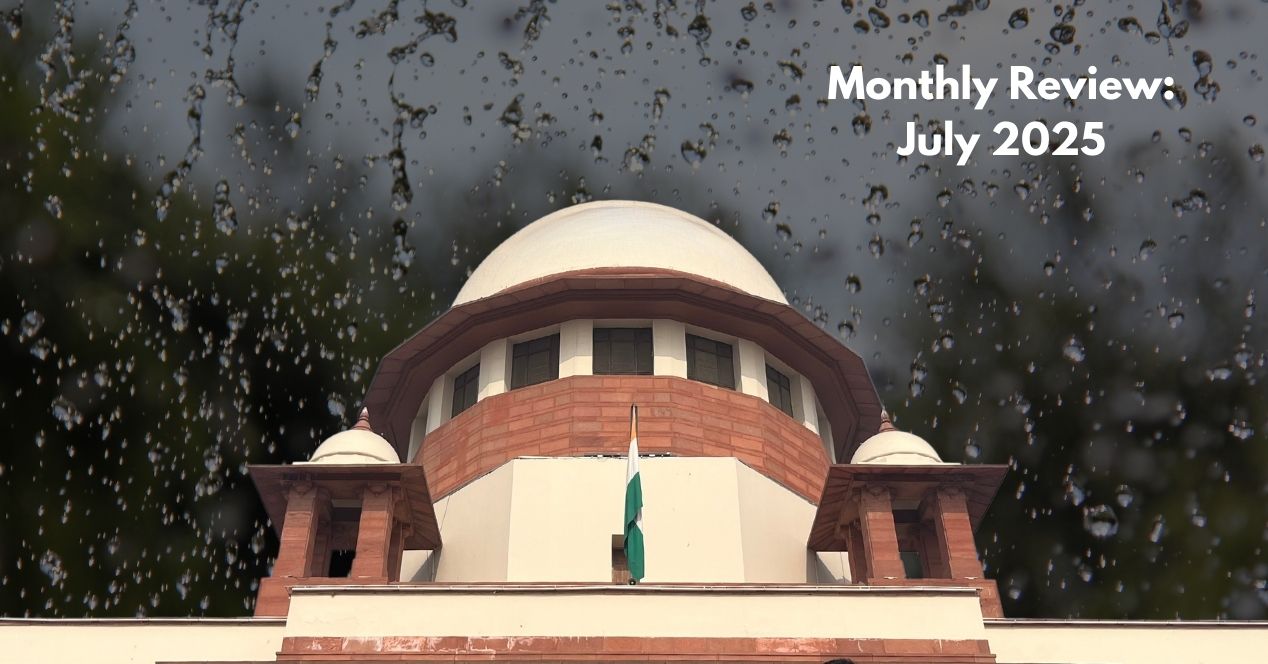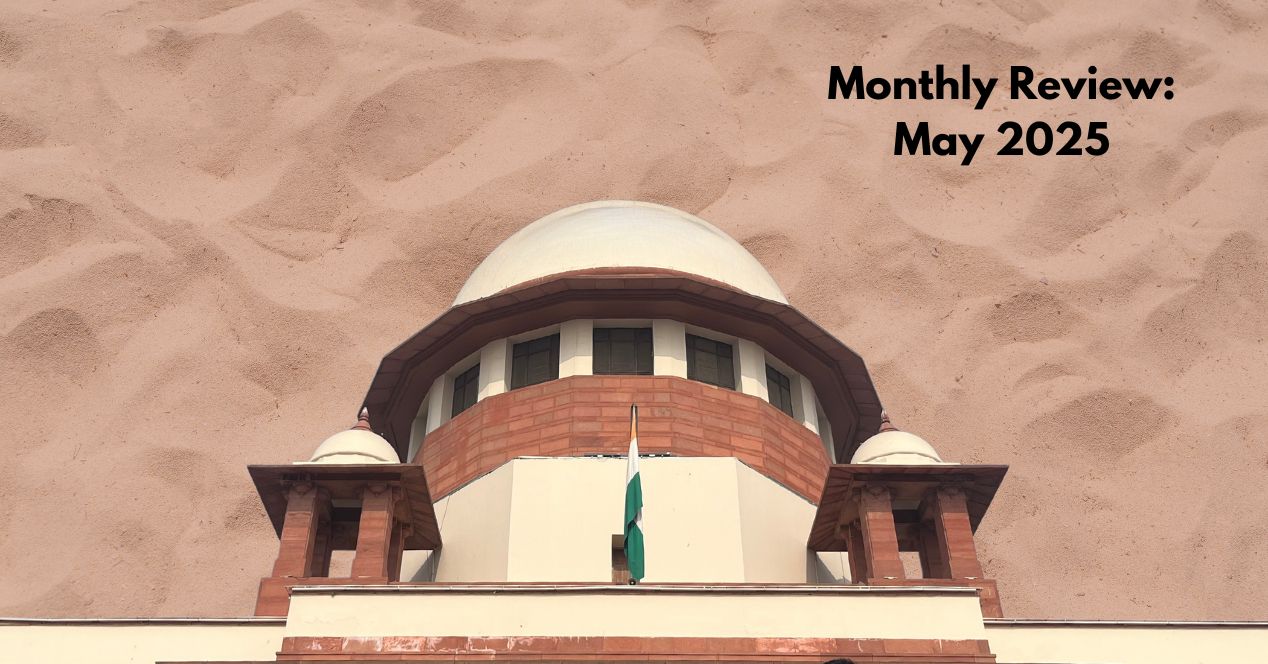Analysis
Monthly Review: August 2025
With a retirement, two new judges, a Presidential Reference and several other major cases, the top court had to juggle it all in August

August was a busy month at the top court. The Constitution Bench, led by CJI B.R. Gavai, heard the Presidential Reference on gubernatorial and presidential powers. In the challenge to Bihar’s Special Intensive Revision, the Court scrutinised the Election Commission’s deletion of nearly 65 lakh voters. The hearings in the plea seeking a review of the Court’s 2022 PMLA judgement flagged concerns over the Enforcement Directorate’s exercise of extraordinary powers.
Justice Sudhanshu Dhulia retired from the Supreme Court on 9 August 2025 after a 3.25-year tenure. As the month ended, Justices Alok Aradhe and V. M. Pancholi were elevated to bring the Court to its full sanctioned strength.
Presidential Reference hearings continue
On 19 August, a five-judge Constitution Bench began hearing arguments in the Presidential Reference on the scope of the Governor and President’s powers under Articles 200 and 201. The proceedings were triggered by the Tamil Nadu Governor (2025) judgment, where a two-judge Bench prescribed timelines for assent to state bills.
States such as Kerala and Tamil Nadu argued that the reference was not maintainable. They contended that the reference would amount to an intra-court appeal. In contrast, the Union maintained that the President had sought clarity and not a review of constitutional questions of far-reaching importance.
The hearings focused on whether a Governor may indefinitely withhold assent and if such decisions can be reviewed by the courts. The Union argued that “withhold” constitutes an absolute veto. The Bench pressed the Union on whether allowing indefinite delays would paralyse legislatures and undermine democracy. Tamil Nadu, appearing later in the month, stressed that indefinite withholding would upset the federal scheme and that Governors are bound by ministerial advice. The Bench reserved its advisory opinion on 11 September 2025.
Electoral roll revision in Bihar
The Supreme Court continued to hear petitions challenging the Election Commission of India’s Special Intensive Revision of electoral rolls in Bihar, which resulted in the deletion of nearly 65 lakh names. Petitioners argued that the exercise lacked statutory backing under the Representation of the People Act, 1950 and violated safeguards recognised in Lal Babu Hussein v ERO (1995) by deleting names without notice or hearing. They also warned that the limited set of prescribed documents, excluding Aadhaar and EPIC, risked disenfranchising women and marginalised groups.
A Bench of Justices Surya Kant and Joymalya Bagchi pressed the ECI on transparency and fairness. On the Court’s suggestion, the Commission agreed to publish district and booth-level lists of deletions with reasons, to publicise them widely and to allow Aadhaar as sufficient proof for filing claims and objections. The Court also directed that booth-level agents of recognised political parties assist excluded voters. It emphasised that “the exercise must be voter-friendly.”
PMLA powers under review
In early August, a three-judge Bench of Justices Surya Kant, Ujjal Bhuyan and N.K. Singh began hearing Karti P. Chidambaram’s review petition against the Court’s 2022 decision in Vijay Madanlal v Union of India. That ruling had upheld the Enforcement Directorate’s (ED) sweeping powers under the Prevention of Money Laundering Act, 2002.
Early on, the Union argued that the petition was essentially just an appeal and did not meet the strict “error apparent” standard for review. The petitioners, however, insisted that all 13 questions of law raised by them, including the constitutional challenge to amendments passed as a Money Bill, remained open for consideration. The Bench chose a two-stage approach, agreeing first to hear arguments on maintainability.
On 7 August, Justice Bhuyan turned the spotlight on the ED’s track record. He drew attention to its heavy caseload, low conviction rates and the opacity surrounding Enforcement Case Information Reports (ECIRs). “You can’t act like a crook; you have to act within the four corners of law,” he remarked pointedly.
The hearings signalled that while the Court remained cautious about reopening its landmark 2022 judgment, it is unwilling to ignore mounting concerns about how the ED’s extraordinary powers are being exercised in practice.
No relief for Justice Varma
On 7 August, the Supreme Court dismissed Justice Yashwant Varma’s petition challenging the report of a three-member in-house committee that had found he exercised “tacit or active control” over a store room where wads of burnt currency were discovered at his official residence earlier this year.
A Bench of Justices Dipankar Datta and A.G. Masih upheld the legality of the in-house procedure, calling it a valid “gap-filling” mechanism given the Constitution’s silence on disciplinary measures short of impeachment. The Court reasoned that the procedure functions as a fact-finding inquiry and not a guilt-finding one. It observed that the same did not prejudice a judge’s rights in subsequent proceedings before Parliament.
Strays to stay
On 22 August, a three-judge Bench led by Justice Vikram Nath modified an 11 August order that had directed the permanent detention of stray dogs in shelters after sterilisation. It observed that the earlier Order was “harsh” and “idealistic” and unworkable given the lack of municipal infrastructure. It reiterated Rule 11(19) of the Animal Birth Control Rules, 2023, which required sterilised and vaccinated dogs to be released back into their localities, with exceptions for rabid or aggressive dogs that must be housed separately.
The Court also ordered the creation of feeding zones in each municipal ward, empowered authorities to act against feeding outside these areas, and allowed adoption under strict compliance. In an unusual step, it directed individual petitioners and NGOs to deposit funds with the Registry to support municipal facilities.
Lately, the Supreme Court has seen a trend of major order reversals in high-profile cases. In a commentary, advocate Aparna Mehrotra and researcher Rishiraj B raised questions about the finality and consistency of its orders.
Comedians directed to apologise online
On 25 August, the Supreme Court expanded proceedings in Ranveer Allahbadia’s case to consider allegedly offensive jokes by comedians Samay Raina, Sonali Thakkar and others mocking persons with disabilities. A Bench of Justices Surya Kant and Joymalya Bagchi said guidelines for online speech must evolve with technology, protect vulnerable groups and preserve free expression.
During the hearing, the Court noted that the comedians had already filed affidavits of apology but directed them to also publish unconditional apologies on their YouTube channels, podcasts and social media. While Justice Kant suggested penalties might be necessary, the Court left that question open for later. The Bench described influencer speech as “commercial speech”, which carried a heightened responsibility. The Attorney General assured the Court that the Union was working on harmonising existing laws with new guidelines.
SC quashes FIR against Mahmudabad
In late August, the Supreme Court quashed one FIR and barred cognisance of a chargesheet arising out of another FIR against Ashoka University professor Ali Khan Mahmudabad. A Bench of Justices Surya Kant and Joymalya Bagchi held that no offence was disclosed and questioned the State’s insistence on pursuing charges. Mahmudabad had come under scrutiny over his Facebook post on Operation Sindoor. The Haryana Police had invoked Section 152 of the Bharatiya Nyaya Sanhita, 2023, the provision often described as the “new sedition law.”
Justice Kant noted there was “nothing in either FIR,” rejecting the request to club them. Senior Advocate Kapil Sibal argued that Mahmudabad’s incarceration amounted to harassment. He criticised the misuse of broad provisions like Section 152, which, he argued, criminalised protected speech.
New elevations, a new CJI-in-line?
In August, the Supreme Court Collegium, led by CJI B.R. Gavai, elevated Justices Alok Aradhe and V. M. Pancholi to the Supreme Court. Justice Aradhe, previously Chief Justice of the Bombay High Court, served across Madhya Pradesh, Jammu & Kashmir, Karnataka, Telangana and the Bombay High Courts. Justice Pancholi, formerly Chief Justice of the Patna High Court, hails from the Gujarat High Court.
With these appointments, the Court reached its full strength of 34 judges. Justice Pancholi is in line to become Chief Justice of India in October 2031.
Justice Pancholi’s elevation raised eyebrows over the opacity surrounding the collegium decisions. Reportedly, Justice B.V. Nagarathna dissented against his elevation.
Justice Sudhanshu Dhulia retires
Justice Sudhanshu Dhulia retired from the Supreme Court on 9 August 2025, marking the end of a three-year and three-month tenure. Reflecting on his years on the Bench, he said, “I will miss my Hindustan.” During his tenure, across 295 benches, he authored 145 judgments spanning religious freedoms, property rights, language recognition, and the protection of vulnerable communities.
SCO.LRs this August
In August, we published four issues in Volume 8 of the Supreme Court Observer Law Reports (SCO.LR). Read them here: Issue 1, Issue 2, Issue 3 and Issue 4.
You can also access them on our landing page with concise summaries, mind maps and HTML versions of each judgement to enhance accessibility and user experience.




